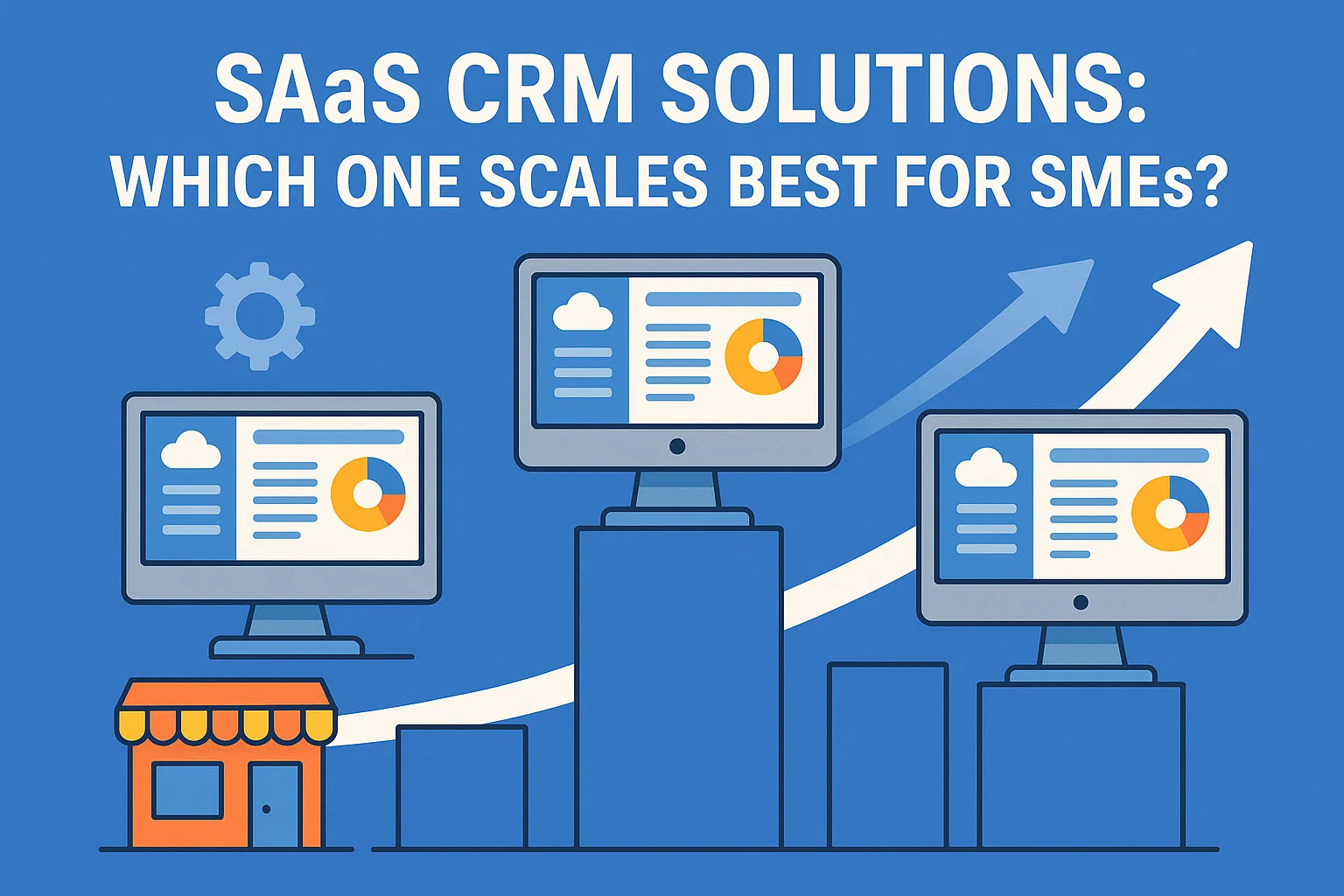SaaS CRM Solutions: Which One Scales Best for SMEs?

SaaS CRM Solutions: Which One Scales Best for SMEs in 2025?
For small and mid-sized enterprises (SMEs), growth comes with complexity. Managing customer interactions, automating sales pipelines, and scaling marketing campaigns are essential—but traditional software can be expensive, rigid, and slow to deploy. That’s where SaaS CRM solutions step in, offering cloud-based, subscription-driven platforms that are affordable, flexible, and built for scalability.
In this detailed guide, we break down the best SaaS CRM software for SMEs in 2025, analyze their pricing, compare features, and highlight which platforms offer the best return on investment (ROI) for Tier-1 markets like the US, UK, Canada, Germany, and Australia.
Why SMEs Need SaaS CRM in 2025
Unlike on-premise CRM systems, SaaS CRMs run entirely in the cloud, making them cost-effective and highly scalable. SMEs benefit from:
- Lower upfront costs: No expensive hardware or IT infrastructure.
- Pay-as-you-grow pricing: Scale with affordable monthly subscriptions.
- Remote access: Sales and support teams can log in anywhere, anytime.
- AI-powered automation: Lead scoring, predictive analytics, and chatbot support.
- Integrations: Easy connections with Google Workspace, Microsoft 365, Slack, Zoom, and accounting tools.
Top SaaS CRM Solutions for SMEs in 2025
We reviewed the most popular SaaS CRM platforms based on scalability, pricing, features, integrations, and support. Below is the updated 2025 comparison:
| CRM Platform | Starting Price | Scalability | Best For | Free Trial? |
|---|---|---|---|---|
| HubSpot CRM | Free / $20 per month | Excellent (SME to Enterprise) | SMEs seeking marketing + sales automation | Yes |
| Zoho CRM | $14/user/month | Strong (Affordable Scaling) | Budget-conscious SMEs | Yes |
| Pipedrive | $15/user/month | Medium (Sales-first CRM) | Sales-focused SMEs | Yes |
| Salesforce Essentials | $25/user/month | High (Enterprise-grade) | SMEs planning enterprise growth | Yes |
| Microsoft Dynamics 365 | $65/user/month | High (Global Enterprises) | SMEs needing Microsoft ecosystem integration | Yes |
Detailed Breakdown: SaaS CRMs for SMEs
1. HubSpot CRM
HubSpot remains the top SaaS CRM for SMEs in 2025. With a free forever plan and powerful marketing automation, it helps SMEs scale without steep upfront costs. Its ecosystem includes Sales Hub, Marketing Hub, and Service Hub.
- Key Strengths: Free plan, email marketing, sales pipeline, AI automation.
- Weakness: Premium plans can get expensive for large teams.
- Pricing: Free / Starter at $20/month, Pro at $90/user/month, Enterprise custom.
2. Zoho CRM
Zoho CRM is known for being cost-effective yet powerful. With advanced features like workflow automation, AI-driven sales insights, and 50+ integrations, Zoho is perfect for SMEs operating on tighter budgets.
- Key Strengths: Affordable, modular add-ons, global support.
- Weakness: Interface can feel complex for new users.
- Pricing: $14 – $52/user/month.
3. Pipedrive
Pipedrive is a sales-first SaaS CRM designed for SMEs with small teams. It’s simple, visual, and focuses on closing deals faster rather than complex marketing automation.
- Key Strengths: Easy-to-use pipeline, automation, reporting.
- Weakness: Lacks advanced marketing tools.
- Pricing: $15 – $99/user/month.
4. Salesforce Essentials
Salesforce is traditionally enterprise-grade, but with Essentials and Professional plans, SMEs can now access its powerful ecosystem. This SaaS CRM is highly scalable, making it the best option for SMEs planning rapid global expansion.
- Key Strengths: Scalable to enterprise level, AI-powered sales forecasting.
- Weakness: Higher learning curve, hidden costs for add-ons.
- Pricing: $25 – $75/user/month; Enterprise $300+/user/month.
5. Microsoft Dynamics 365
For SMEs that already use the Microsoft ecosystem (Office 365, Teams, Outlook), Dynamics 365 is a seamless CRM option. Its deep integrations make it ideal for finance, manufacturing, and B2B SMEs.
- Key Strengths: Microsoft integration, enterprise-grade tools.
- Weakness: More expensive compared to Zoho/HubSpot.
- Pricing: $65 – $210/user/month.
Hidden Costs of SaaS CRM for SMEs
While subscription costs look attractive, SMEs must account for:
- Implementation: $500 – $5,000 depending on customization.
- Integrations: Some APIs cost extra beyond limits.
- Training: Team onboarding costs can add up.
- Premium Support: Many vendors charge extra for priority support.
CRM Pricing by SME Type
| SME Type | Annual SaaS CRM Budget | Recommended CRM |
|---|---|---|
| Startup (1-10 users) | $500 – $5,000 | HubSpot Free, Zoho Standard, Pipedrive Starter |
| Growing SME (10-100 users) | $10,000 – $50,000 | HubSpot Pro, Zoho Professional, Salesforce Essentials |
| Scaling SME (100-500 users) | $50,000+ | Salesforce Professional, Microsoft Dynamics, HubSpot Enterprise |
Which SaaS CRM Scales Best for SMEs?
In 2025, the answer depends on your growth path:
- Best Free + Starter CRM: HubSpot CRM
- Best Budget CRM: Zoho CRM
- Best Sales-Focused CRM: Pipedrive
- Best Scalable CRM: Salesforce Essentials
- Best Microsoft Ecosystem CRM: Dynamics 365
Final Thoughts
SaaS CRM solutions in 2025 allow SMEs to scale without breaking the bank. From free tools like HubSpot to enterprise-ready solutions like Salesforce, SMEs now have more flexibility than ever. The key is to choose a CRM that matches your current needs but can grow with your business into the future.
FAQs
1. Which is the most affordable SaaS CRM for SMEs?
Zoho CRM offers the most affordable paid plans, starting at just $14/user/month.
2. Can free SaaS CRMs scale for SMEs?
Yes, HubSpot Free CRM scales well with affordable paid upgrades when SMEs expand.
3. What SaaS CRM is best for SMEs planning international expansion?
Salesforce Essentials and Microsoft Dynamics 365 provide global scalability with enterprise features.
4. Do SaaS CRMs charge hidden fees?
Yes, common hidden costs include API usage, advanced reporting, premium support, and additional storage.
5. Which CRM gives the best ROI for SMEs?
HubSpot CRM delivers the best ROI thanks to its free starter plan and integrated marketing automation tools.
Comments (3)